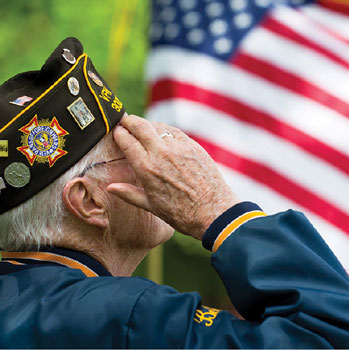 Many veterans believe that they have to have suffered an in-service disability to qualify for U.S. Department of Veterans Affairs’ monetary benefits. This is a common misconception.
Many veterans believe that they have to have suffered an in-service disability to qualify for U.S. Department of Veterans Affairs’ monetary benefits. This is a common misconception.
Depending on their health status, income and assets, many senior veterans and their dependents or surviving spouse can qualify for not only basic “Improved Pensions” based on low income, but also for supplemental benefits. The supplemental benefits are called “Housebound Benefits” and “Aid & Attendance Benefits.”
PENSION BENEFITS
To qualify for any of these pension benefits, the veteran (or surviving spouse, based on the veteran’s military service record) must satisfy the following general criteria:
• The veteran must have served at least 90 days of active duty.
• At least one of the 90 days of active duty must have been during wartime. Dates have been officially defined for the beginning and end of World War II, the Korean War and the Vietnam conflict. The Gulf War, which began Aug. 2, 1990, is not concluded yet.
• The veteran must have received a discharge other than dishonorable.
• The claimant and household must have limited income and assets.
• The claimant must have a permanent and total disability at the time of application (note that a surviving spouse can qualify for a basic low-income pension without being disabled, but the veteran must be disabled — although the disability does not have to be related to wartime or military service).
• The disability must have been caused without the willful misconduct of the claimant and must not have been due to alcohol or drug abuse.
HOUSEBOUND & A&A BENEFITS
As the name implies, Housebound Benefits are payable when the claimant is substantially confined to his or her home because of permanent disability. To qualify for Aid & Attendance Benefits, the claimant must:
• Require the aid of another person in order to perform personal functions for everyday living (such as bathing, eating, dressing, toileting, transferring from bed to a wheelchair or dealing with incontinence), OR
• Be bedridden, in that he or she must remain in bed apart from any prescribed course of convalescence or treatment, OR
• Be a patient in a nursing home due to mental or physical incapacity, OR
• Be blind or have very poor vision.
Applying for these supplemental benefits is not a quick or simple process, and you may want to enlist the help of a veterans’ assistance organization or a specially-trained individual. Note that whoever assists with the application cannot charge a fee for that service. However, if the individual or organization performs other services, fees may be incurred.
SCOTT MAKUAKANE, Counselor at Law
Focusing exclusively on estate planning and trust law.
www.est8planning.com
O‘ahu: 808-587-8227 | maku@est8planning.com


Leave a Reply